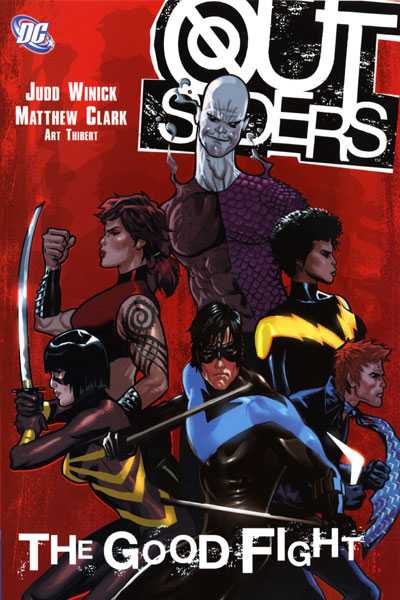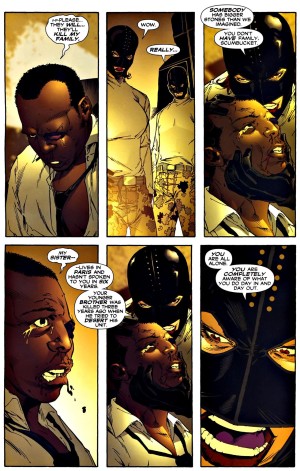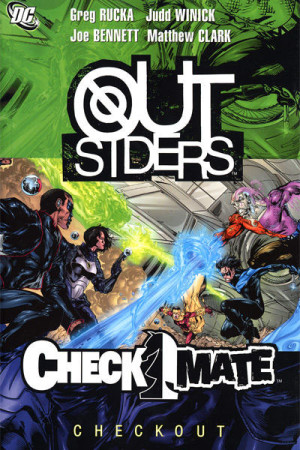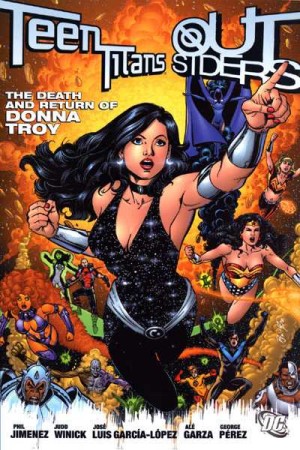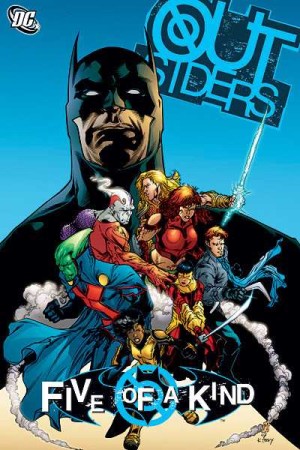Review by Ian Keogh
After the events of company crossover Infinite Crisis every DC comic jumped forward a year. The opening chapter, therefore, doesn’t continue from previous volume Crisis Intervention. It actually doesn’t appear to continue from any previous DC story, as over fifteen pages Judd Winick instead focuses on a problem besetting several African countries. Children are kidnapped from their villages at a relatively young age, brutalised, and then set free to roam in packs with guns. With no moral guidance or control, the results are horrifying. To that Winick adds elements of several other conflicts that have beset African countries over the years. It’s an extremely effective piece of superhero-free storytelling, yet ultimately introduces those now comprising the Outsiders.
Commendably, Winick completely reconfigures the Outsiders and their objective parameters. Instead of being a team of superheroes striving to eliminate the bigger threats among the super villain community, they’re now a mixture of covert agents and paramilitary unit. They take on the tasks the superhuman community generally believe themselves unable to touch due to complex political considerations. It’s not too far removed from the 1980s Suicide Squad in outlook. The difference is that Winick has a greater inclination to debate the ethical issues, as these Outsiders move well beyond the norms in ensuring what they consider the greater good. Beyond that Winick has adjusted his approach when it comes to the bread and butter of superhero comics, the fight scenes. The willingness to take matters further adds a frisson, and early on there’s an effective look at how someone with the powers of a Justice League member works as a villain. Winick also makes good use of Metamorpho’s shapeshifting and chemical altering abilities.
Most of the book is illustrated by Matthew Clark, providing solid superhero art, and that’s also the case when he’s deputised by Tom Grindberg and Ron Randall. Pop Mhan has a more individual style that clashes with the remainder. The layouts are good, the figures less so, angular and distorted.
The plot segues smoothly into an investigation of the applications of superhero DNA. Winick foreshadows later problems well, and rectifies his earlier dismissal of a pair of villains as second rate, creating dialogue for them veering between the ludicrous and the poetic. It’s very entertaining.
Less so are some of the final chapter’s revelations. From the start Outsiders has taken a very open approach to sex, a path some might intrinsically object to within a mainstream superhero title. It’s frequently been awkwardly handled, veering from sniggering frat boy comments to the occasional uncomfortable sincerity. The Good Fight presents a same sex relationship. Winick’s Pedro and Me was a well considered rumination on that topic, and it’s possible that this stems from those same good intentions, a desire to expand the orientations of the superhero pool. The way it comes across, however, is as gratuitous rather than any natural evolution of those characters. It’s given some context and credibility in the next book, but here, what a shame, especially as The Good Fight is otherwise the highspot of Winick’s Outsiders.
The final pages contain a revelation that undermines what the Outsiders are doing, presenting them with two considerable problems to be dealt with in Pay As You Go.
